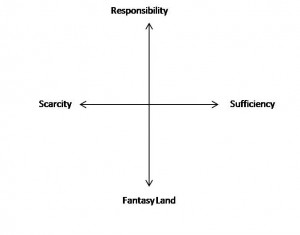When we are open to breaking free of money, when we decide now is the time to allow our lives to flow regardless of our monetary circumstances, we can take the second step in breaking free:
Understand how to be responsible about money without allowing scarcity to dominate and without traveling to Fantasy Land.
During my inquiry into sufficiency I have discovered my conversations about money move along two continuums: one is between responsibility and Fantasy Land and the other is between scarcity and sufficiency. For most folks responsibility can seem boring (hence this current mortgage crises); however, I believe that being conscientious, reliable and trustworthy about how I earn and spend money brings me clarity and integrity and allows me to listen to my deepest needs and desires.
When I go to Fantasy Land—a technical finance and investment term—that is when I buy things I haven’t allocated the money for. When I use credit cards with no thought of the next bill, when I buy the next thing and the next thing and I have not opened, read or completed the last thing. It is when I lose focus, don’t know what is in the bank, how much I have spent, what I owe or what is owed to me. When I am deep in Fantasy Land I feel trapped and breathless by money.
What is scarcity? When I don’t have enough, when I define myself by what I have in the bank (see part one) It is also when I feel: failure, fear, resentment, doubt, impatience, vulnerability, shame or when I am hoarding or comparing my money to someone or something else. The more opportunities I create to move away from scarcity and toward sufficiency, the more opportunities and growth become available.
What is sufficiency? I have to confess that I am rarely at the far end on the sufficiency continuum when it comes to money. However, I do have moments when I do feel fulfillment, flow, gratitude, ease and appreciation about money. I feel sufficient when I honor and trust myself and allow for anything to happen. Those are the moments when I experience sufficiency.
Ultimately, I believe that we arrive at sufficiency about money when we know what is enough . . .
what is enough money for you?




